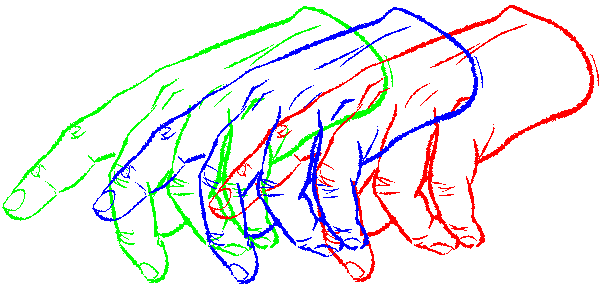The Death of the Online Persona (and Safety)

One of the first things I learned in my online safety classes as a child was to NEVER give out any personal information about yourself.
As a child, exposed to the infinite potential of the internet, I felt like I was taking a glimpse into another world. Armed with the rules given to me by our teachers, I was free to embark upon my journey into the web as a completely different person. I could choose a new name, have an ambiguous gender (yet still be referred to as a man by most other users), and instead be judged by the silly picture I chose as an avatar instead of my real human face and body. I could reinvent my personality from the ground up and pretend to be someone else, or I could just truly freely be myself, just with an extra layer of dressup and anonymity. The web was my oyster, and I was excited to see who I could become.
However even when you had so many options, many people decided they wanted to be more open about themselves on their personal webpages. How often would you stumble across the website of a young man, indicating their site is aimed towards friends and family, who would write about life events and share vacation photos? How about the pages of married couples, showing off wedding photos and stories of how they met? All the while, sharing their real names, real ages, and exact dates and locations of when things happened to them? Of course, adults were allowed to do whatever they wanted online, but to my young mind it made me curious.
Even beyond safety concerns, I had to know — why would you ever want to go online and mirror the things you do in real life? The beauty of the web, to me, was that it WASN'T real life. Perhaps I could go online and chat in forums or play in virtual worlds with my real life friends, but we could have these fun dressed up avatars. We could go by silly names we stole from fantasy characters and go on adventures. I had no interest in sharing anything real, not at all. In the end, though, I concluded that since everyone's experience was so malleable, people could share whatever they wanted online, and that was that. Looking back, I figured it wasn't so bad after all, considering the web was so decentralized that someone's page really might only be visited by friends and family.
I remember the first time that I realized we were losing the choice to be anonymous online. One day, deciding that keeping all my favorite videos in my bookmarks was a bit of a hassle, I decided to make a Youtube account to save and access them on other computers. This was around the time that Google+ became a thing, so I ended up having to input a sort of variation on my online alias, and somehow Google identified the name that I put in was fake. This struck me as peculiar — I had been going by fake names and titles for years online. Now it wanted me to prove my identity so I could make an account? That was ridiculous. However, I still didn't use my real name, and instead just picked a slightly less fake sounding name, which Google accepted.
To be clear, it's not like this hadn't existed before — Facebook always could tell when you used a silly/fake name as well — but this was the first time I had come across it as a young teen. My privacy worries only grew when I was finally peer pressured into making a Facebook account by my crush. Again, I had gone with the alias I had started out with for Google+, and I was very quickly met with an identity verification screen. Facebook had also immediately known I had picked a fake name, but instead of accepting a more realistic-sounding name, it demanded photo ID or for me to give up and type in my real name. And when I had put in my real name, not receiving any pushback and immediately getting accepted...? This freaked me out beyond measure.
How could it have possibly known what my real name was? At the time, I had never inputted my real name for any reason online. While I might not understand what kind of database Facebook was referencing, I soon found out that other corporations intended to start building their own and sharing them around. In the following years, as social media began to become the primary avenue for interacting with others on the web, I found that more and more sites were asking for more than just my full (legal) name, but now my phone number. Perhaps it was just an easier way to sign in for mobile users, yet now it's mostly asked for under the guise of two-factor authentication. Not even an authenticator app can save me these days. Gone are the days of purely email verification and security questions — now every website wants a personal method of contact I rarely even give out to my closest friends.

But I digress. I could go on about the privacy concerns, the data breaches, police access to our data, all the what have you... but everyone has done that already. There has been a greater cultural conversation about this since 2016 during the American election debacle. Instead, I want to focus on the greater social changes in behavior as a result of this demand for more information.
I can't exactly pinpoint WHEN this started, but as Web 2.0 began to take hold, we began seeing most internet traffic crystallize in a few platforms, particularly social media. Facebook, Twitter, Instagram... the list goes on. Around the time that most sites began optimizing for mobile and creating dedicated mobile apps, it became commonplace for many websites to ask for your phone number during signup. It was much quicker - no email verification! Instead, the app would politely ask for access to your text messages and would automatically verify through that avenue.
And so it continued. Eventually, developing for desktop computers became a secondary task, with many website layouts being completely overhauled to look better on the much smaller smartphone screen. Even more apps came out that were social media you could only use on a smartphone, like Snapchat or Instagram. In hindsight, maybe we should have been worried. Both apps would ask for your phone number during the signup process and had geolocation features built in.
That brings us to today. Despite flawed attempts by the Web3 crowd to "decentralize" the web once more, the truth is that most people these days are going to choose to spend their time on one of the few corporate-run social media apps. I believe that, being in an era where 82% percent of Americans use social media, people on some level have grown desensitized to freely giving away their personal information. This reflects itself in the way we see people sharing information about themselves through their profiles on these apps.
These days, you can go on most social media sites and a person will fall into maybe one of three archetypes. The first type of user will not give out much (if any) personal identifying information on their profile. They probably only use social media to share memes or content they found interesting in some way. The second type of user will share their full name, have a selfie as their profile picture, and have some form of location identification in their bio (state, town, school). Often these are people in professional fields or perhaps people you've met in your math class at school. The third category probably won't have a selfie and instead go by an online alias of some kind, but will list other identifiers such as their age and pronouns. Shockingly, these users will, in some ways, take things a bit further than the second type of user.
The second type of user may not post too frequently, sharing things very occasionally that usually pertain to their interests. Maybe they'll post a selfie here and there. Social media to them is where they can show off an idealized version of themselves and their life, the way most people think about these platforms. They treat it like a scrapbook. However, the third type of user will treat social media a lot more seriously, almost as a second life that they can live more authentically. Their bios may contain LOTS of personal information, including but not limited to race, nationality, gender, sexuality, political affiliation, physical illnesses, mental illnesses, neurodivergencies... some people even will list their trauma triggers.
On the one hand, it's understandable. With the overwhelming decline of forums, it makes sense that you might want to attract more people like you by having some of this information easily accessible. Being able to find community is important, and the internet is a great place to do that. It always has been. However, the beauty of forums was that they were oftentimes run by moderators who have an interest in protecting community members from harrassment. And if you didn't like the moderators or believed they were corrupt, you could just move to a different forum or even start a new one. The problem is that a platform like Twitter has (at least) over 200 million active users all of varying backgrounds and beliefs and is moderated by algorithms and underpaid workers with poor working conditions. And this leads to alot of harrassment going under the radar or intentionally being ignored by the system.

I would probably not be so worried if there weren't so many horror stories about people online having their personal information used against them. On the lower end of the spectrum, I've seen hundred page long callout posts detailing all the different accounts one single person might have had online. New threads pop up on forums constantly sharing the names, locations, and personal family histories of people online. There are so many streamers on websites like Twitch.tv who have gotten SWAT teams sent to their houses by viewers or other players. Personally I have read threads about ex-friends of mine that shared more information about their life history than I ever knew when talking to them. Don't even get me started on Chris-chan.
Even ignoring the danger one can put themself in by giving away so much information, there is almost an expectation nowadays to do so. Even average users seem to want to know everything important about you at a glance, so they don't have to find out something that shocks them about you later on. This is especially prevalent on platforms like Twitter. Twitter is known as a relatively volatile platform where people will share opinions on important issues within only 240 characters. There is the common thought that an outsider to a particular marginalized group cannot have an opinion on an issue that concerns this group, and on the web, the only way to tell if someone is part of a marginalized group is if they're actively advertising it. This may put some people in the position of having to out themselves as a certain race/gender/sexuality to put in their two cents on something. Again, this is understandable if you are in a community primarily consisting of people in a similar social group as you, but you can also see how declaring this information to the world may put a target on your back.
The more time I spend navigating different social media, the more I realize that people seem to have forgotten the basic principles of internet safety. Personally, I can't help but reminisce about the days where people only knew me by my username, and even my closest online friends maybe only ever got to know my first name as far as personal info goes. Am I being a bit old fashioned? Well, maybe, but in a world where almost every website is trying to track you, gather data on you, and then sell that data to who knows where, I can't help but feel a little concern about these trends. Seeing how the average layman seems to use people's personal info to stalk harass them is a huge cause for concern as well. If the corporate web is hell-bent on destroying any notion of privacy we have, we should at least embrace the attempt at anonymity more than we currently do.
 This article was created by
Tyoma
This article was created by
Tyoma
